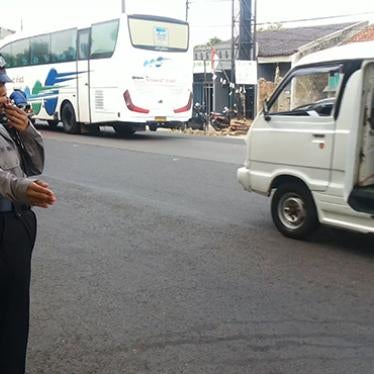(Jakarta) – The new Indonesian government should take decisive action to address religious intolerance and a rollback in women’s rights, Human Rights Watch said today in its World Report 2015.
The human rights challenges facing President Joko Widodo, who took office on October 20, 2014, are immense. He inherited a legacy of worsening sectarianism and security force impunity from his predecessor, Susilo Bambang Yudhoyono.
“President Widodo has spoken of the need for greater respect for human rights in Indonesia,” said Phelim Kine, deputy Asia director at Human Rights Watch. “He needs to back up those words with concrete actions.”
In the 656-page world report, its 25th edition, Human Rights Watch reviews human rights practices in more than 90 countries. In his introductory essay, Executive Director Kenneth Roth urges governments to recognize that human rights offer an effective moral guide in turbulent times, and that violating rights can spark or aggravate serious security challenges. The short-term gains of undermining core values of freedom and non-discrimination are rarely worth the long-term price.
In 2014, the Indonesian government made some important progress on human rights, Human Rights Watch said. The Indonesian parliament passed the Mental Health Law in July to address the country’s dire mental healthcare situation. Widodo himself has explicitly promised to investigate specific enforced disappearances in 1998. He also gradually lifted the taboo on discussing the 1965 anti-Communist massacres, the focus of Joshua Oppenheimer’s award-winning film The Act of Killing. And in February, Indonesia and Saudi Arabia signed an agreement that allows Indonesian domestic workers in Saudi Arabia to keep their passports, communicate with their families, get paid monthly, and have time off.
The Widodo government should move quickly to defend religious minorities from harassment, intimidation, and violence by militant groups, Human Rights Watch said. On May 29, 2014, Islamist militants carrying wooden bats and iron sticks attacked the home of book publisher Julius Felicianus in Yogyakarta while his family conducted an evening Christian prayer meeting, injuring seven. Police arrested the alleged leader of the attack but later released him after local authorities pressured Felicianus to drop charges to maintain “religious harmony.”
Religious intolerance fueled by discriminatory local regulations also remains a serious problem in Indonesia. In September, the parliament in Aceh passed two Islamic bylaws that extend Islamic law to non-Muslims, criminalizing alcohol drinking, consensual same-sex relations, and all sexual relations outside of marriage. The bylaws permit as punishment up to 100 lashes and up to 100 months in prison.
The Widodo government should also address the rollback in women’s rights over the past decade, Human Rights Watch said. Many local regulations require female students and civil servants, among other women and girls, to wear the hijab. Across the country, female applicants to Indonesia’s National Police must take abusive, degrading, and discriminatory “virginity tests.”
Papua’s festering low-level pro-independence insurgency led by the Free Papua Movement (Organisasi Papua Merdeka, OPM) continued to result in human rights abuses by Indonesian security forces. As of late October, at least 69 Papuans were imprisoned for peaceful advocacy of independence. Indonesian police arrested French journalists Valentine Bourrat and Thomas Dandois on August 6, 2014, on charges of “working illegally”; they were released for time-served on October 24 after a Jayapura court sentenced them to two-and-a-half months in prison. Although Widodo indicated in July that he would seek to end the government stranglehold on foreign media access to Papua, he had not done so by year’s end.
“President Widodo should uphold human rights and prosecute those who abuse them,” Kine said. “Indonesians have waited a long time for a government that will protect their rights rather coddle the abusers. It’s time for Widodo to deliver.”







